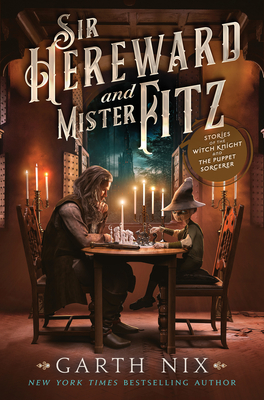 Sir Hereward and Mister Fitz: Stories of the Witch Knight and the Puppet Sorcerer by Garth Nix
Sir Hereward and Mister Fitz: Stories of the Witch Knight and the Puppet Sorcerer by Garth Nix Format: eARC
Source: supplied by publisher via Edelweiss
Formats available: hardcover, paperback, ebook, audiobook
Genres: fantasy, sword and sorcery
Pages: 304
Published by Harper Voyager on August 22, 2023
Purchasing Info: Author's Website, Publisher's Website, Amazon, Barnes & Noble, Kobo, Bookshop.org, Better World Books
Goodreads
New York Times bestselling author Garth Nix's exciting adult debut: a new collection including all eight stories--plus a never-before-published story--featuring Sir Hereward and his sorcerous puppet companion Mister Fitz, gathered in one magical volume for the first time ever!
Sir Hereward: the only male child of an ancient society of witches. Knight, artillerist, swordsman. Mercenary for hire. Ill-starred lover.
Mister Fitz: puppet, sorcerer, loremaster. Practitioner of arcane arts and wielder of sorcerous needles.
Sir Hereward and Mister Fitz: godslayers. Agents of the Council of the Treaty for the Safety of the World, charged with the location and removal of listed extra-dimensional entities, more commonly known as gods.
Together, they are relentless travelers in a treacherous world of magic, gunpowder, and adventure.
Compiled for the first time ever, these eight magical stories--plus an all-new tale, "The Field of Fallen Foes"--featuring fabulous, quintessential Garth Nix protagonists Sir Hereward and Mister Fitz comprise a must-have adult fantasy collection for fans and those about to discover the witch knight and his puppet sorcerer for the first time.
My Review:
A long time ago in a galaxy not far away at all SFWA (Science Fiction Writers of America) Grand Master Fritz Leiber loosed a pair of anti-heroish-type heroes into the world of fantasy, and the genre was never the same. I’m referring to the immortal swordsman Fafhrd and his rogue companion the Gray Mouser, who together embodied the subgenre of sword and sorcery.
Sir Hereward and Mister Fitz follow in those bootprints, right down to the boots being rather large in the cases of both Fafhrd and Sir Hereward, and considerably smaller for the Gray Mouser and Mister Fitz.
Just as the earlier pair roamed the world of Nehwon, traveled through places strange, wondrous and frequently unpronounceable, tackling enemies both mundane and sorcerous, putting down old gods and monsters when needed, so do Sir Hereward and Mister Fitz, their literary if not actual descendants, wander their own world of unpronounceable places filled with even more tongue-twisting gods, carrying out one mission after another for the Council of the Treaty for the Safety of the World, tasked with casting rogue gods back to whatever corner of the multiverse they sprang from.
The stories here are just that, stories. This is a collection of nine stories that feature the titular pair, as they carry out their missions – sometimes deliberately and occasionally by accident – as they travel their world and keep very, very far from home.
In their very first adventure, “Sir Hereward and Mister Fitz Go To War Again”, originally published in 2007, we meet the witch knight Hereward and the puppet sorcerer Mister Fitz as they start out pursuing a bit of mercenary work to tide them over financially, only to wind up doing their real job when they discover a rapacious godlet who is draining all the lands around itself in a bid for more power. There’s a bittersweet tone to this story as Hereward knows he must deal with the godlet’s adherents whether they serve out of true belief or a sense of duty and wishes that it didn’t always end quite like this.
All of the stories in this collection, save the final story, “The Field of Fallen Foe”, have been published over the intervening years between that first story and this last – but hopefully not final – one.
Each story is an adventure in its own right, each stands very much alone as they were published with that intent, but together they build up a portrait of an all-too-often-literal ‘ride or die’ friendship as the knight and the puppet save each other even as they bicker together over and over.
It’s also a bit of a cast-against-type kind of partnership, as Mister Fitz is an autonomous puppet who has lived for so many centuries that he has passed into legend, while Sir Hereward is barely an adult – sometimes – at a mere twenty five. That Mister Fitz was originally Mistress Fitz and their relationship began when Mistress Fitz was Hereward’s nanny just adds layers to their partnership and their endless bickering.
And it’s considerably more common in their adventures that Fitz is the one who gets the job done and saves both the day and his partner, while Hereward plays the bait and has the credit thrust upon him in the end. Because Fitz is smart enough to hide the literal lights of his eyes and his sorcerous needles under his very tall and broad hat.
Any reader who remembers Fafhrd and the Gray Mouser and the genre they embodied will love Sir Hereward and Mister Fitz, while anyone looking for a compelling series of adventures that can be read in tasty bites – or who just likes a good buddy story no matter where the buddies are hanging out – will have a terrific time with Sir Hereward and Mister Fitz.
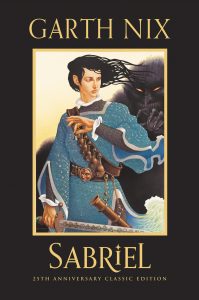 Escape Rating B+: I’ve always meant to read the author’s Old Kingdom series, but it fell victim to the ‘so many books, so little time’ conundrum, as so many do. So it’s buried somewhere in the virtually towering TBR pile but has never managed to rise to the top. Reading Sir Hereward and Mister Fitz bumped it up quite a bit higher, but it’s a VERY tall pile.
Escape Rating B+: I’ve always meant to read the author’s Old Kingdom series, but it fell victim to the ‘so many books, so little time’ conundrum, as so many do. So it’s buried somewhere in the virtually towering TBR pile but has never managed to rise to the top. Reading Sir Hereward and Mister Fitz bumped it up quite a bit higher, but it’s a VERY tall pile.
I enjoyed my journey with Sir Hereward and Mister Fitz rather a lot, but then I did love Fafhrd and the Gray Mouser when I read them back in the 1970s, and they were already classics at that point. I love sword and sorcery, and it’s something that you don’t see much of right now. Like many subgenres, I expect it will come back around again, just as urban fantasy was everywhere in the 1980s, died down in the early 2000s but seems to be coming back around again.
As I write this, I have the sense that I’m not doing the collection justice. And I think that’s because, while the collection as a whole definitely made an impression that lingers, I found that the individual stories in this collection were not memorable in and of themselves. I’m not dealing well with handling that dichotomy.
The not-individually-memorable part may be due to the way that these were originally published. Each needed to stand on its own, so there’s a fair bit of repetition in the setup of each story that slows things down a bit. But, over the course of the whole, we do get plenty of clues about the two characters, their personalities, their histories and most definitely their relationship. In the end, if you like the way the two of them work together, the whole thing is a treat but if they don’t resonate with you then the collection won’t work for you either.
Personally I would love a remix of this collection as a full-length novel or one that sinks its teeth into the earlier days of their association because they are fascinating characters and the hints of their origin story – especially Mister Fitz’ – and the world they inhabit would be (literally and figuratively) fantastic.
It’s not required to have read Leiber’s Fafhrd and the Gray Mouser stories to get into Sir Hereward and Mister Fitz, but if you have you’ll find much that seems familiar. However, if this book teases you to pick up the classic, the first collection is Swords and Deviltry – and I remember it very fondly.
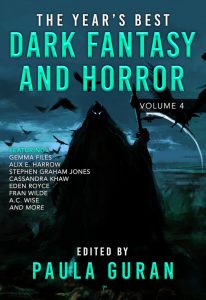 Two final notes about Sir Hereward and Mister Fitz. There’s a story in the forthcoming collection The Year’s Best Dark Fantasy & Horror: Volume Four titled “The Voice of a Thousand Years” by Fawaz Al Matrouk that influenced my reading of Sir Hereward and Mister Fitz and gave me an overall sense of bittersweetness that isn’t exactly there in the text but now that I’ve read them close together I can’t get it out of my head.
Two final notes about Sir Hereward and Mister Fitz. There’s a story in the forthcoming collection The Year’s Best Dark Fantasy & Horror: Volume Four titled “The Voice of a Thousand Years” by Fawaz Al Matrouk that influenced my reading of Sir Hereward and Mister Fitz and gave me an overall sense of bittersweetness that isn’t exactly there in the text but now that I’ve read them close together I can’t get it out of my head.
And, on a much greater note of whimsy, for anyone who has ever played Final Fantasy IX, there’s a strong possibility that Vivi Ornitier is a portrait of the sorcerous puppet as a very young mage.

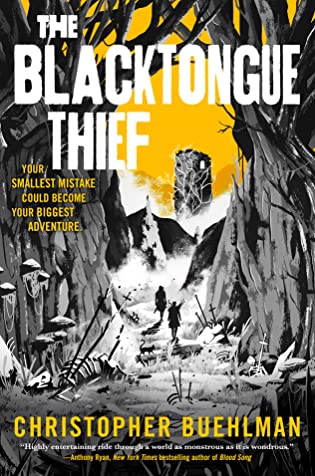 The Blacktongue Thief (Blacktongue, #1) by
The Blacktongue Thief (Blacktongue, #1) by 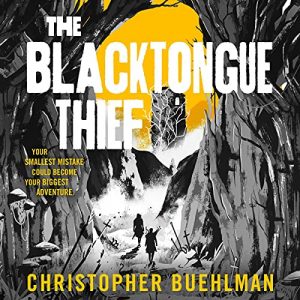
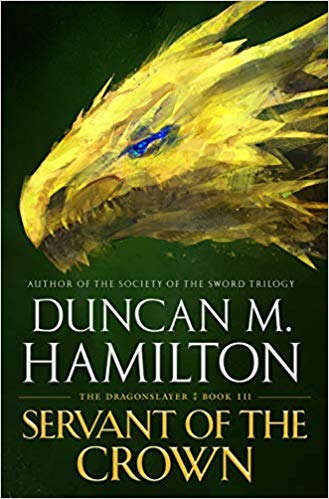 Servant of the Crown by
Servant of the Crown by 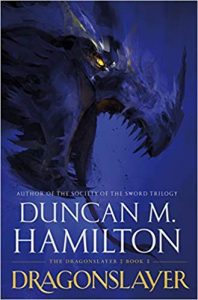 First things first. I just want to say what a treat it was to start a series, fall in love with it, and be able to just read – or be read to – all the way through to the end without having to wait months if not years for the later books in a series. I don’t always have that opportunity, either because I fall in love with the first book long before the others are out, or because I run into the “so many books, so little time” conundrum and have to space things out because of other reading commitments. Because I waited to start the first book (
First things first. I just want to say what a treat it was to start a series, fall in love with it, and be able to just read – or be read to – all the way through to the end without having to wait months if not years for the later books in a series. I don’t always have that opportunity, either because I fall in love with the first book long before the others are out, or because I run into the “so many books, so little time” conundrum and have to space things out because of other reading commitments. Because I waited to start the first book (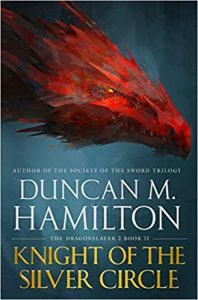 Soléne is that young hero. Gill’s the one out in front to collect all the glory and fight all the battles, or so it seems. But she’s every bit the hero that he is, just from behind the scenes. Her power is huge, but it is also quiet. She’s the mage who operates in the shadows, not because she’s the woman inspiring the hero, but because the power she wields works best from the dark – and the quiet. He knows that she brought him the victory, and he knows that the best thing he can do for her is to acknowledge that privately and not publicly. Not that the Crown won’t give her its own semi-public acknowledgements. Maybe. If they succeed.
Soléne is that young hero. Gill’s the one out in front to collect all the glory and fight all the battles, or so it seems. But she’s every bit the hero that he is, just from behind the scenes. Her power is huge, but it is also quiet. She’s the mage who operates in the shadows, not because she’s the woman inspiring the hero, but because the power she wields works best from the dark – and the quiet. He knows that she brought him the victory, and he knows that the best thing he can do for her is to acknowledge that privately and not publicly. Not that the Crown won’t give her its own semi-public acknowledgements. Maybe. If they succeed.
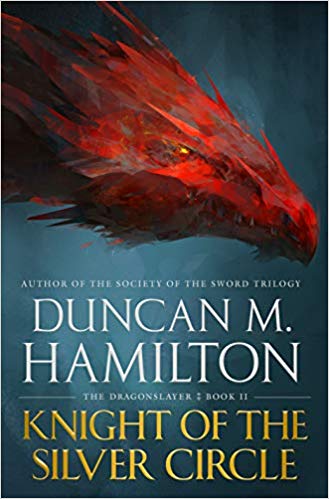 Knight of the Silver Circle by
Knight of the Silver Circle by 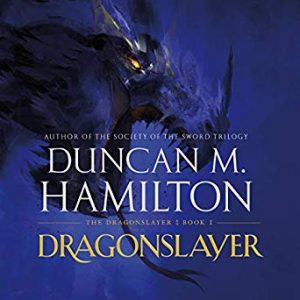 I want to call Guillot dal Villerauvais an antihero, because if there’s one thing the man does not want to be, it’s a hero. He’s been there and done that and knows, for sure, for certain and for true, that the so-called glory is empty. As tempting as the adulation still is, he’s all too aware that it’s a cup of poison.
I want to call Guillot dal Villerauvais an antihero, because if there’s one thing the man does not want to be, it’s a hero. He’s been there and done that and knows, for sure, for certain and for true, that the so-called glory is empty. As tempting as the adulation still is, he’s all too aware that it’s a cup of poison.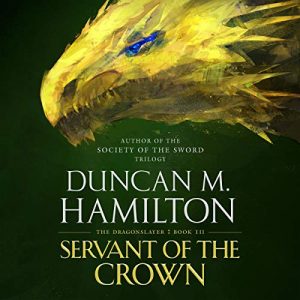 At the same time, there’s an underlying truth to this part of the saga that reminds me in a very peculiar way of Star Trek IV: The Voyage Home. If you’re not familiar, that’s the one with the whales. And Mirabaya or at least its Prince Bishop, like the Earth of that movie, is about to discover that the thing that can save them is the thing that they’ve been so successful at destroying.
At the same time, there’s an underlying truth to this part of the saga that reminds me in a very peculiar way of Star Trek IV: The Voyage Home. If you’re not familiar, that’s the one with the whales. And Mirabaya or at least its Prince Bishop, like the Earth of that movie, is about to discover that the thing that can save them is the thing that they’ve been so successful at destroying.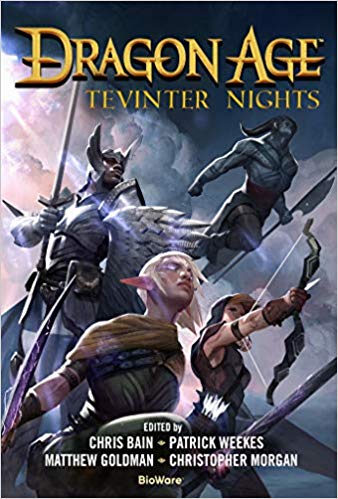 Dragon Age: Tevinter Nights by
Dragon Age: Tevinter Nights by 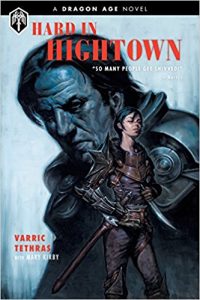 And the stories themselves, well, if you’re familiar with where they’re coming from, the collection is a rollicking good time. Maybe not all of the stories are quite worthy of a Tethras (
And the stories themselves, well, if you’re familiar with where they’re coming from, the collection is a rollicking good time. Maybe not all of the stories are quite worthy of a Tethras (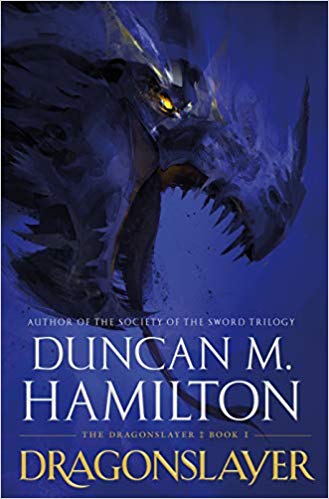 Dragonslayer by
Dragonslayer by 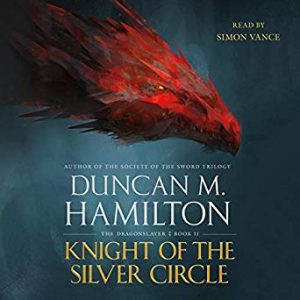 Last but not least, while this book was published in mid-2019 and probably finished sometime the previous year, finishing it today showed some striking parallels between the way that towns and villages were emptying out in hopes of getting away from the dragon and the response to the current COVID-19 pandemic in real life. In both cases, public spaces are empty and people are fearful. A virus is even harder to outrun than a flying, fire-breathing dragon.
Last but not least, while this book was published in mid-2019 and probably finished sometime the previous year, finishing it today showed some striking parallels between the way that towns and villages were emptying out in hopes of getting away from the dragon and the response to the current COVID-19 pandemic in real life. In both cases, public spaces are empty and people are fearful. A virus is even harder to outrun than a flying, fire-breathing dragon.